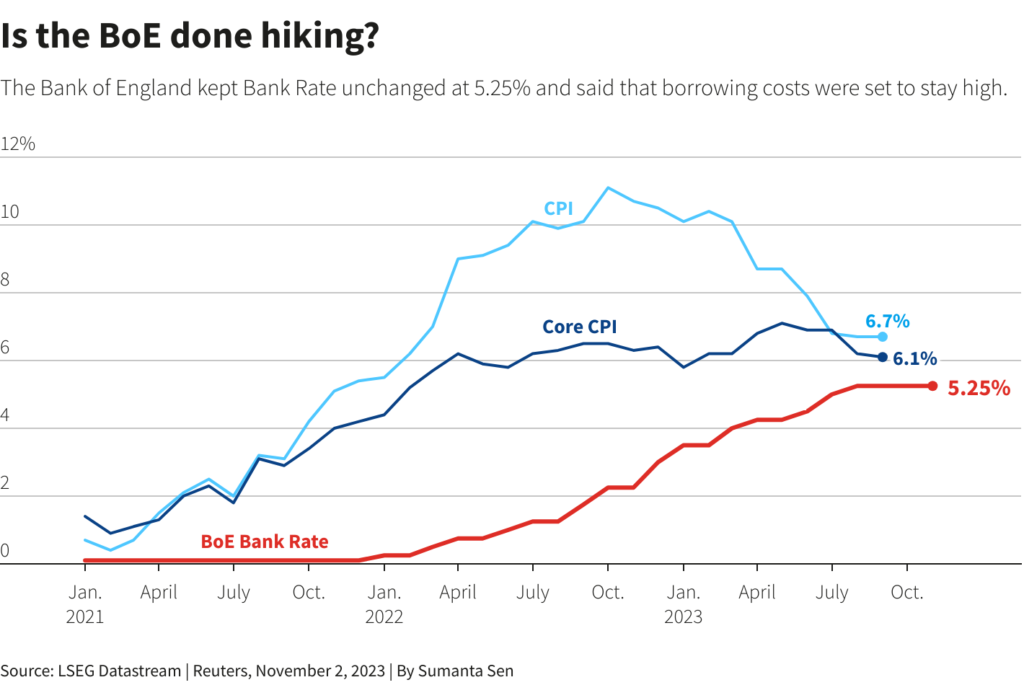LONDON, Nov 2 (Reuters) – The Bank of England held interest rates at a 15-year peak on Thursday and ruled out cuts any time soon as it fights to “squeeze out of the system” the highest inflation of the world’s big rich economies.
Despite saying the economy was close to a recession and would have no meaningful growth in the coming years, the BoE reinforced its message that it would keep borrowing costs high.
The Monetary Policy Committee (MPC) voted 6-3 to keep Bank Rate at 5.25%, repeating its September decision after 14 back-to-back increases, as expected in a Reuters poll of economists.
“The MPC’s latest projections indicate that monetary policy is likely to need to be restrictive for an extended period of time,” the British central bank said.
Britain’s economy is already under strain from the run-up of interest rates between December 2021 and August this year, with about half of the impact of those rate hikes yet to be felt.
Warning against complacency, Governor Andrew Bailey said inflation was still too high and that the BoE was determined to get it all the way back to its 2% target.
“We will be watching closely to see if further increases in interest rates are needed,” he said. “But even if they are not needed, it is much too early to be thinking about rate cuts.”
British government bond yields were down sharply as investors looked at the gloomy economic picture painted by the BoE and decided its next move in rates was likely to be lower.
The BoE will keep monetary policy restrictive only for long enough to “squeeze inflation out of the system”, Bailey said.
The European Central Bank and the U.S. Federal Reserve have similarly decided to keep rates on hold in recent days as they wait to see if their strong dose of rate hike medicine will curb the world’s worst outbreak of inflation in decades.
Ellie Henderson, an economist with Investec, said central bankers on both sides of the Atlantic were avoiding the kind of guidance that proved misplaced early in inflation’s rise.
“In an extremely uncertain world – including on what exactly would constitute a ‘neutral’ level of interest rates – there is little to gain from central banks calling the end and putting their credibility on the line should a resumption of rate rises become necessary after all,” she said.
[1/2]A pedestrian walks past the Bank of England in the City of London, Britain, September 25, 2023. REUTERS/Hollie Adams/File Photo Acquire Licensing Rights
Bailey acknowledged that the conflict in the Middle East created a risk of higher energy prices that could feed through into inflation, but said that had not happened so far.
MPC members Megan Greene, Jonathan Haskel and Catherine Mann voted to raise rates to 5.5%. Sarah Breeden voted to keep rates on hold at her first meeting since replacing Jon Cunliffe.
FLAT-LINING ECONOMY
Although inflation has fallen from 11.1% – its highest since the 1980s – just over a year ago to 6.7% in the most recent data, it remains more than three times the BoE’s 2% target.
The central bank said it expected no growth in Britain’s economy in July-September, before expansion of just 0.1% in the fourth quarter. It forecast zero growth in 2024 and an expansion of just 0.25% in 2025.
Even so, inflation would only return to 2% at the end of 2025, roughly six months later than previously forecast.
Markets continued to bet that the BoE would keep interest rates on hold until at least August next year, when it would probably start to lower them. The BoE showed no sign that it was challenging those expectations in its forecasts.
Economists were split on when Bank Rate might fall. Investec’s Henderson pointed to the second quarter of 2024 as inflation cools. Allan Monks at JP Morgan predicted rates would stay on hold throughout next year.
The BoE said the inflation rate was likely to drop to 4.8% in October, almost two full points lower than in September, as the impact of last year’s gas price surge fades.
It is still keeping a close eye on strong wage growth, however, which it fears could keep price pressures simmering.
The central bank said there were “increasing uncertainties” about official labour market data, which has been hampered by low survey response rates, but jobs growth was likely to have been weaker than it previously thought. It also expected worryingly strong growth in wages would cool off.
One detail in the BoE’s otherwise downbeat assessment of the economy is likely to be welcomed by Prime Minister Rishi Sunak.
It predicted inflation of 4.6% in the fourth quarter of 2023, which would mean Sunak meets his pledge to voters to have price growth this year, ahead of an election expected in 2024.
Editing by Catherine Evans
: .


